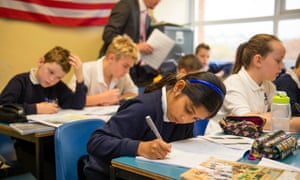14 The wedding of two people who ostensibly have nothing to do with most people in the country has been the hot topic in playgrounds and classrooms over recent weeks. Despite Prince Harry and Meghan being wholly unrepresentative of the schoolchildren in my area of the UK, pupils have been transfixed by the details. They want to talk about the dress Meghan wore, the car Prince Harry drove to the reception. They’re proud this glamorous, confident American is becoming part of British history.
15 It’s as if teachers are expected to protect this image of Britain rather than facilitate real learning
16 As a history teacher, I’m often struck by the topics students engage with and those they do not. When a pupil asked me how a new module about slavery was relevant to this country, I explained that it was the British who facilitated and spread the slave trade across the world. “That’s nothing to do with me,” he replied. “Why should I be bothered about stuff that happened miles away to people that are long gone?” It’s a different story in lessons about Winston Churchill and the second world war, when that same class will be captivated.
19 Some of the blame lies with a curriculum that focuses on British “wins”, and the politicians that shape the culture of learning in our schools. In 2013, Michael Gove had to backtrack on plans to revise the curriculum after criticism from teachers and academics that his proposals placed too much emphasis on British history. Gove had felt too much history teaching was informed by post-colonial guilt, but his draft was steeped in nationalism – something reinvigorated by the Brexit debate, and by Donald Trump’s presidency in the US (and the popularity of slogans such as “America first”). Although Gove’s curriculum was revised, those calls for more “British history” have not gone away. In 2016, politicians and historians were still arguing that lessons about the British empire were deliberately anti-British, despite research finding otherwise.


20 I have found an inherent bias in the curriculum that runs the other way. Pupils are brought up learning about the strength and heroism of this country and its once “grand” empire rather than about how other countries have suffered under its rule. It’s as if teachers are expected to protect this image of Britain rather than facilitate real learning.


21 My classroom is not diverse. I teach mostly white boys and girls, and the occasional student whose grandparents were immigrants. But I worry about the impact this nationalism could have on them. In a school where exposure to other cultures is minimal, teachers arguably have a greater duty to expose pupils to other world views.
25 Students rarely hear anything about the countries that are in poverty or strife because of the fallout from British actions – Zimbabwe and Palestine are good examples. The recent Windrush scandal has highlighted my pupils’ limited knowledge of Britain’s past actions. Many had previously learned that Britain took great pride in inviting “those poor colonials” to live in this country, but found it hard to reconcile the cruelty that came with it – the low wages, the “No blacks” signs in boarding house windows and the secretive deportations. Some with more rightwing views sought to blame the immigrants themselves.


26 Perhaps with a more balanced curriculum, students would have a better reference point for considering such events. I feel hypocritical in my practice by not providing both sides of the world’s political and historical story. Some schools encourage teachers to go off curriculum – but these are one-off lessons not schemes of work, and student exposure is limited. It shouldn’t be – in my experience, pupils appreciate the less British and Eurocentric lessons as a breath of fresh air.


27 It is terrifying that students who have become so desensitised to the world’s historical journey will one day vote to shape the future of the country. There is a real risk that this will become a single-minded generation that does not care about international issues unless it is directly affected by them. Unless this train of thought is challenged, it will continue. This generation only has one side of the story.









0 archived comments